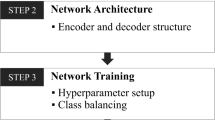Abstract
Liver cancer is a common malignant tumor and one of the main causes of cancer deaths in the world. Accurately segmenting liver tumor regions from the liver has a very important guiding role for doctors in disease diagnosis and surgical planning. Thus, the method of automated segmentation of liver tumors has important value for clinical diagnosis and treatment. This paper proposes a method that combines fully convolutional neural networks based on two-dimensional convolution and those based on three-dimensional convolution. The results show that the liver tumor segmentation effect of this method is much better than that of only using single two-dimensional convolutional neural networks or three-dimensional convolutional neural networks.
Access this chapter
Tax calculation will be finalised at checkout
Purchases are for personal use only
Similar content being viewed by others
References
Long, J., Shelhamer, E., Darrell, T.: Fully convolutional networks for semantic segmentation. IEEE Trans. Pattern Anal. Mach. Intell. 03, 32 (2014)
Dakua, S.P., Abinahed, J., Al-Ansari, A.A.: Pathological liver segmentation using stochastic resonance and cellular automata. J. Vis. Commun. Image Represent. 34, 89–102 (2016)
Liu, D.D., Mu, W.B., Li, J.Y.: Study on differential diagnosis technique of artificial intelligence radiography for primary hepatocellular carcinoma with different pathological types. Basic Clin. Pharmacol. Toxicol. 129, 19 (2020)
Yuan, J., Wang, D., Cheriyad, A.M., et al.: Factorization-based texture segmentation. IEEE Trans. Image Process. 24(11), 48–49 (2015)
Havaei, M., Davy, A., Farley, D.W., et al.: Brain tumor segmentation with deep neural networks. Med. Image Anal. 35, 36–41 (2017)
Zhang, W., Li, R., Deng, H., et al.: Deep convolutional neural networks for multi-modality isointense infant brain image segmentation. Neuro Image 17, 53–69 (2015)
Havaei, M., Davy, A., Warde-Farley, D., et al.: Brain tumor segmentation with deep neural networks. Med. Image Anal. 35, 61–69 (2017)
Acknowledgements
Project Source: 2019 Basic scientific research operating cost project of provincial undergraduate universities in Heilongjiang Province, Project number: 2019-KYYWF-1252.
Author information
Authors and Affiliations
Corresponding author
Editor information
Editors and Affiliations
Rights and permissions
Copyright information
© 2021 The Author(s), under exclusive license to Springer Nature Switzerland AG
About this paper
Cite this paper
Mu, W. et al. (2021). Study on Liver Tumor Segmentation Technology Based on Fully Convolutional Networks. In: Xu, Z., Parizi, R.M., Loyola-González, O., Zhang, X. (eds) Cyber Security Intelligence and Analytics. CSIA 2021. Advances in Intelligent Systems and Computing, vol 1342. Springer, Cham. https://doi.org/10.1007/978-3-030-70042-3_102
Download citation
DOI: https://doi.org/10.1007/978-3-030-70042-3_102
Published:
Publisher Name: Springer, Cham
Print ISBN: 978-3-030-70041-6
Online ISBN: 978-3-030-70042-3
eBook Packages: Intelligent Technologies and RoboticsIntelligent Technologies and Robotics (R0)




